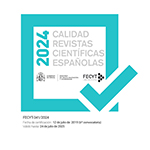Composición numérica en Petrarca, Boscán y Shakespeare. Nota sobre el caso de Sir Thomas Wyatt y Garcilaso de la Vega
Resumen
Although the number of Shakespeare’s Sonnets, 154, is possibly related to the figure 153 of the miraculous fishing in the Gospel (John, XXI, 1-14), as was pointed out by A. Fowler (1970), T.P. Roche (1989) and is mentioned in K. Duncan-Jones edition (1997), precedents in the use of this figure in can - zonieri by Continental Petrarchists and in other genres are ignored by students of early modern English poetry. This paper continues previous work on elements of the numerological exegesis of Augustine of Hippo (In Iohann. evang. tract., 122) in Juan Boscán’s Libro II (1543) – the first canzoniere to be printed in Spanish- and in Petrarch’s Canzoniere as a precedent. The paper calls for a revaluation of the influence of Spanish Petrarchism on English poetry in this period, and advances some proposals which will be futher substantiated in the forthcoming book Composición numérica, petrarquismo y redención («Numerological Composition, Petrarchism and Redemption»). The paper ends with a brief interpretation of an ottava rima by Thomas Wyatt, written on his leaving Spain in 1939, which is considered here a veiled homage to Garcilaso de la Vega.Descargas
Descarga artículo
Licencia
La revista Cuadernos de Filología Italiana, para fomentar el intercambio global del conocimiento, facilita el acceso sin restricciones a sus contenidos desde el momento de su publicación en la presente edición electrónica, y por eso es una revista de acceso abierto. Los originales publicados en esta revista son propiedad de la Universidad Complutense de Madrid y es obligatorio citar su procedencia en cualquier reproducción total o parcial. Todos los contenidos se distribuyen bajo una licencia de uso y distribución Creative Commons Reconocimiento 4.0 (CC BY 4.0). Esta circunstancia ha de hacerse constar expresamente de esta forma cuando sea necesario. Puede consultar la versión informativa y el texto legal de la licencia.










